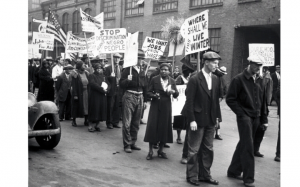A photograph of the 1931 “unemployed march” in St. Louis.

Destitute pea pickers in California. Mother of seven children. Age thirty-two. Nipomo, California
2
In October 1929, the crash of the stock market signaled the start of the Great Depression. President Hoover at the time was not willing to intervene. The Great Depression led to a huge unemployment rate, the decline of industrial production and the decline of corp production. As we can see in the two photos above, people started to march for unemployment. Homelessness was widespread in the United States at the time. In 1933, the unemployment rate rose to 25% and it was even worse for blacks and other immigrants. The GNP decreased to 50 billion. The second picture above shows the result of the great depression-desperate mothers having a hard time feeding their children.
The Bank Run

As the great depression hit the U.S., the money demanded rose significantly. Huge crowds started to withdraw their money from the bank. This Bank Run exacerbated the economic crash.
FDR and The New Deal
3
Franklin Roosevelt was re-elected to the president in 1932. He instituted the New Deal, increasing government intervention in the economy. The government supported trade unions and workers’ right. It passed the emergency banking act in 1933 and provided aids to companies and to parents for taking care of children. The FDR government also led massive road, infrastructures and reservoir construction to provide job opportunity.
4,‘It Seems to Me That I Am More to the Left than You, Mr. Stalin.’ An interview with Stalin.
This is an interview conducted by HG Wells to Stalin, the Leader of the Soviet Union on Oct 27th, 1934. The US economy took a hit during the time and President Roosevelt just implemented the New Deal to save the US economy. In this interview, Stalin commented on the New Deal as a communist way. This reflects the debate that was, in fact, popular within the U.S. as well. People were arguing that the New Deal broke the law of capitalism.
